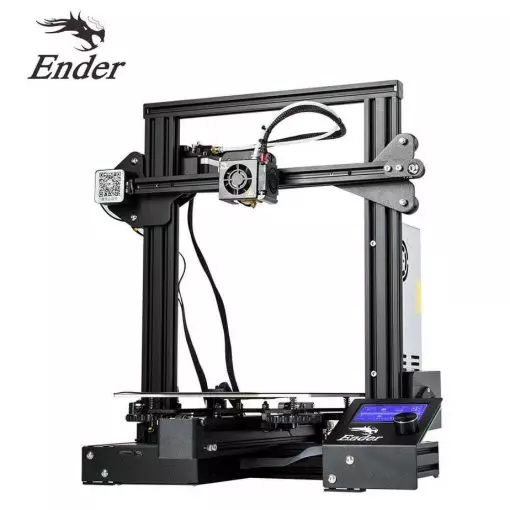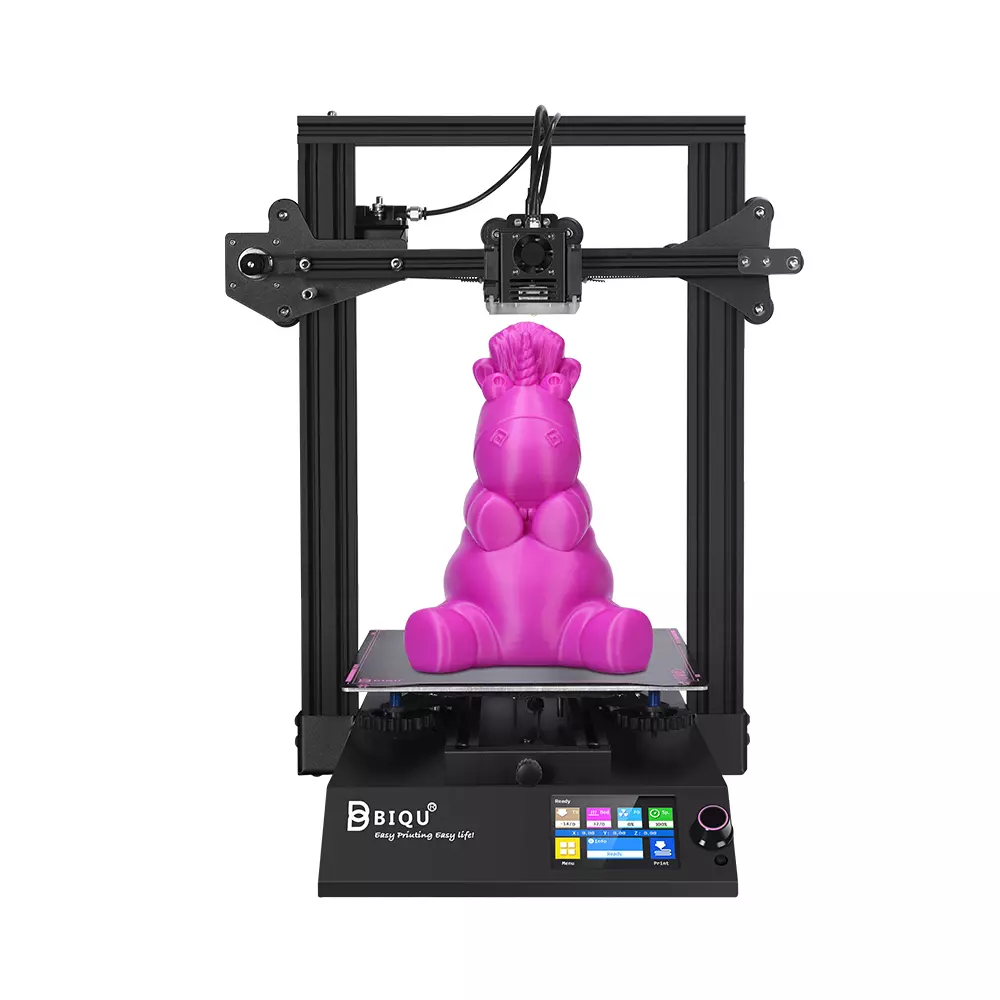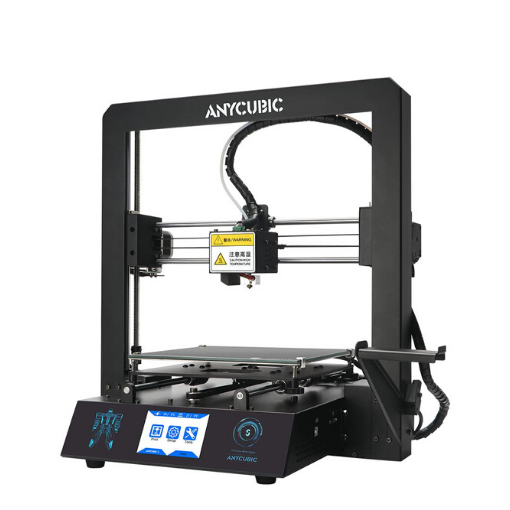Compare Ender 3 vs BIQU B1 vs Mega S
Comparison between the best 3D printers
Choose the best 3D printer at the best price. The cheapest 3D printers are here.
Buy a 3D printer here with 3D Fila.
 |
 |
 |
|
| Model | Ender 3[BUY Ender 3] |
BIQU B1 |
Mega S |
| Printing Material | Filament | Filament | Filament |
| Estimated price | $210,00 | $269,00 | $149,00 |
| Fabricante | Creality 3D | BigTreeTech | Anycubic |
| Release Year | 2018 | 2020 | 2019 |
| Print Volume [mm] | 220x220x250 | 235x235x270 | 210x210x205 |
| Printer Size [mm] | 440x440x465 | 412x402x492 | 405x410x452 |
| Weight [kg] | 6,62 | 8,00 | 14,5 |
| Power Loss Recovery | NO | YES | YES |
| Enclosed printer | NO | NO | NO |
| Bed Leveling | Manual | Manual | Manual |
| Filament End Sensor | NO | YES | YES |
| Bed type | Heated | Heated | Heated |
| Power supply system | Bowden | Bowden | Bowden |
| Standard nozzle | 0,4 | 0,4 | 0,4 |
| Maximum Nozzle Temperature [°C] | 255 | 250 | 260 |
| Maximum Bed Temperature [°C] | 110 | 100 | 110 |
| Maximum printing speed [mm/s] | 180 | 100 | 100 |
| Filament holder | YES | YES | YES |
| Camera for supervision | NO | NO | NO |
| Recommended filaments | PLA, TPU, ABS, PETG | PLA, TPU, ABS, PETG | PLA, TPU, ABS, PETG |
| Recommended slicers | Cura, Simplify, Slic3r | Cura, Simplify, Slic3r | Cura, Simplify, Slic3r |
| Maximum Resolution [mm] | 0,1 | 0,1 | 0,1 |
| Processor | 8 bits | 32 Bits BTT SKR V 1.4 | 8 bits |
| Display | Mono | Touchscreen TFT 3,5'' | Touchscreen TFT 2,8'' |
| Power Supply | 24V / 270W | 24V / 360W | 12V / 300W |
| Connectivity | SD / USB | SD / USB | SD / USB |
| Operating systems | Windows, Mac, Linux | Windows, Mac, Linux | Windows, Mac, Linux |
| Date of registration in the system | 2021-04-13 | 2021-04-14 | 2021-04-15 |
| Release date | 2018 | 2020 | 2019 |
| Extra features | The Ender 3 V1 is a DIY assembly 3D printer, a sales leader since 2017, standing out for its cost-benefit. With a wide printing capacity, it has a CNC machined structure for precision and stability. It offers high-precision prints with low noise, thanks to its innovative V-profile and pulleys. It has a self-adhesive magnetic platform for easy removal of models and excellent adhesion. The Ender 3 heats up quickly, reaching 100°C in 5 minutes, ideal for agile prints. It includes protection against power failures, allowing you to resume printing after interruptions, saving time and material. | The BIQU B1 is an advanced 3D printer with a silent 32-bit BTT SKR V1.4 motherboard and ARM Cortex-M3 CPU, offering DIY interfaces (I2C, SPI, WiFi) and dual Z-axis. Its dual BTT B1 TFT35 V3.0 operating system allows real-time monitoring and multiple printing modes, including G-code visualization effects. It stands out for its BIQU SSS (Super Spring Steel), ensuring easy model adhesion and simplified removal, with the possibility of using it on both sides. It includes a filament sensor, automatically pausing printing in case of filament breakage. The multicolored RGB lights integrated into the hotend allow you to view the printing status even at night. Additional notes include the need for a BIQU-specific Type-C cable and extra interfaces for smart filament sensor and BL Touch. | The Anycubic Mega S offers a printing platform with excellent adhesion, easy removal after cooling. It has a filament sensor for a better experience with flexible materials and a multilingual and intuitive color touchscreen. Assembly is quick, requiring only 8 screws and 3 connections. It has a large build volume (210 x 210 x 205 mm), high positioning accuracy and supports a variety of materials, including TPU, PLA, ABS and wood. It stands out for its solid metal structure, superior stability, high-quality printing with layer resolution of up to 50 microns, Ultrabase for easy adhesion and removal of parts, resumption of printing after power outage, high-quality extruder for flexible filaments, suspended filament support and stable structure that reduces shaking, improving printing quality. |
| Support for multiple colors and materials (AMS and CFS) | NO | NO | NO |
Notes * |
|||
| Cost-benefit | 6 / 10 | 7 / 10 | 7 / 10 |
| Hardware | 0.5 / 10 | 2 / 10 | 2 / 10 |
| Screen | . | . | . |
| Print volume | 3 / 10 | 3 / 10 | 3 / 10 |
| Performance | 1 / 10 | 1 / 10 | 1 / 10 |
| [BUY Ender 3] |
Conclusion |
| In comparing the Ender 3, BIQU B1, and Anycubic Mega S, each 3D printer presents a unique set of features, advantages, and pricing which cater to different user needs. The Ender 3 stands out for its impressive cost-performance balance, making it an excellent entry-level option for beginners in 3D printing. While it lacks advanced features like power loss recovery and filament sensors, it compensates with a larger print volume and a robust construction, thereby delivering reliable performance. Its reputation for being easy to assemble and maintain adds to its appeal, particularly for those new to the hobby. Meanwhile, the BIQU B1 offers a more advanced experience with its 32-bit motherboard, enabling quieter operation and more features like dual Z-axis control and a filament sensor. This model is ideal for users who want to experiment with additional functionalities and a slightly larger print volume, albeit at a higher price point. The innovative design aspects, including real-time monitoring capabilities, and the BIQU SSS bed system for easier model removal, make it an attractive choice for experienced users seeking better precision and performance. On the other hand, the Anycubic Mega S, although priced lower, offers solid performance and features a user-friendly assembly process. While it has a slightly smaller print volume compared to the other two models, it excels in stability and print quality. Its heated bed and high positioning accuracy make it well-suited for a wide range of filaments, particularly flexible materials. In conclusion, the choice among these three models ultimately hinges on the user's priorities. For those prioritizing cost-effectiveness and reliability, the Ender 3 is an ideal choice. The BIQU B1 is best for users looking for advanced features and capabilities, while the Anycubic Mega S is suitable for beginners and those who prioritize ease of use and print quality. Each printer holds its own in the competitive 3D printing market, and potential buyers should assess their specific needs and budget to select the best option for them. |

